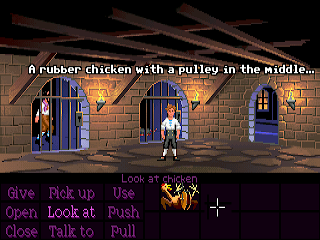 Lucas Arts adventure games hold a special place in my heart, as you can tell from the name of this blog. So I've been following the Vintage Game Club's discussion of Grim Fandango with some interest, even though I'm not participating and, in fact, never played the game.
Lucas Arts adventure games hold a special place in my heart, as you can tell from the name of this blog. So I've been following the Vintage Game Club's discussion of Grim Fandango with some interest, even though I'm not participating and, in fact, never played the game.Much of the discussion so far has centered on the difficulty of the game's puzzles. One of the hallmarks of the Lucas Arts games was the twisted logic of the inventory based puzzles, which often became clear only in retrospect. Consider the scene in The Secret of Monkey Island in which Guybrush is tethered to an idol and thrown off a pier. Dozens of sharp objects surround him, all just a little bit further than he can reach. He is unable to cut the the anchor keeping him on the sea floor.
The solution? Pocket the statue, and walk away. It is the last thing you would think of, and yet within the game world it makes perfect sense. Moreover, because it is the only object in the scene that Guybrush can interact with, no other solution is even conceivable.
Most of the puzzles make more sense than that. But they all require a degree of lateral thinking that action games don't match. My favorite Lucas Arts puzzles are completely straightforward, but it's hard to analyze your way through them. More often, the solution springs from that elusive "Eureka moment," when your brain suddenly connects two pieces of information in a totally new way.
But I've got to be honest: I didn't make my way through these games by myself. In fact, I didn't even own them. I played through The Secret of Monkey Island, Monkey Island 2, Day of the Tentacle, Sam and Max Hit the Road, and Full Throttle all at my friend Justin's house. He walked me through them almost every step of the way, giving me hints where appropriate and solutions where necessary. I did as much as I could on my own, but given the choice between agonizing over some esoteric puzzle, or moving ahead with the storyline, I chose the easier option every time. I don't know if that helped me enjoy these games more, or less. But how could I possibly have liked them more?
Puzzle games weren't the only genre in which I needed a boost. Another friend of mine in elementary school, Ryan, was a gaming savant. There was no single-player game he couldn't rip through, and no multiplayer game in which any of us could compete with him. He entered the Nintendo World Championships and did all right for himself, advancing beyond the state level, if I recall correctly. He was sponsored by Child World, the toy store, and the Framingham location had his picture on their wall. Most of what I learned about playing video games, I learned from him. He was GameFAQs before there was GameFAQs.
Ryan couldn't help me play action games the way Justin helped me play puzzle games, but I improved just by watching him. I never would have figured out on my own to use the Wood Shield against Air Man, the the Air Blades against Crash Man, or the metal blades against Metal Man -- to say nothing of navigating the tricks and traps of Dr. Wiley's castle. To this day, Mega Man 2 is the only game in the series I can beat, because it's the only one I was able to watch Ryan play. My list of vanquished NES games is brief, but I think Ryan deserves credit for just about all of them.
I know lots of people who consider using walkthroughs to be cheating, and whose enjoyment of video game derives from overcoming challenges. But frankly, I think the help I got from my friends is part of the reason I came to love games in the first place. These days I'm much more apt to bail on a game that's giving me too much trouble, because, after all, there are so many other games out there. People remember Contra as being brutally difficult, but even today I can still power through it without even using The Code, and only because I got the guidance I needed from a friend. I cannot say the same about any game released in the last, oh, 15 years or so.
It's hard to remember that some of these older games were ever that difficult, if we can recall them only through the prism of victory. Which brings us back to Grim Fandango. The quirky nature of the puzzles is confounding several of the folks participating in the Vintage Game Club. And it seems to be keeping some of them from fully surrendering themselves to the world that Schafer and company created. What's the better outcome: letting the game defeat you, or getting by with a little help from your friends?
This post is an entry in the July '08 Round Table. To read more entries, use the dropdown below.
Note: After writing -- and titling -- this entry, I saw that another Round Table bloggist had covered much the same ground. It was a coincidence, I swear!











